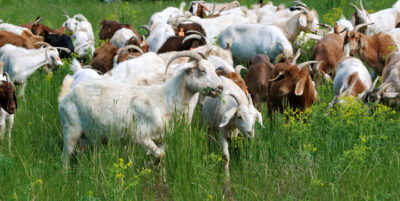Weed-eating goats are back in city parks
By Herald on June 11, 2021.
 A herd of experienced, weed-eating goats chow down on invasive weeds Friday morning at Alexander Wilderness Park. The goats will be working in parts of the city’s river valley parks throughout the summer.
Herald photo by Dale Woodard
A herd of experienced, weed-eating goats chow down on invasive weeds Friday morning at Alexander Wilderness Park. The goats will be working in parts of the city’s river valley parks throughout the summer.
Herald photo by Dale WoodardDale Woodard – Lethbridge Herald
Invasive weeds got your goat?
No problem, the City of Lethbridge, in partnership with Magrath-based Creekside Goat Company have the goats that can go get them.
And they’re not kidding.
After successfully grazing invasive weeds for the past three summers, the City is bringing in another herd of experienced, weed eating, local goats to continue grazing weeds in Alexander Wilderness Park and Indian Battle Park over the course of the summer, finishing up in August.
The herd will be based out of Alexander Wilderness Park to start and will later be transported to Indian Battle Park to target weeds there. Invasive weeds such as leafy spurge, wormwood, thistle, crested wheat grass and brome grasses will act as food for the goats.
Jackie Cardinal, Parks Natural Resource Coordinator for the City of Lethbridge said the project started in 2018 when they were approached by Robert Finck, co-owner of Creekside Goat Company.
“We had been thinking about goats for a while,” she said. “The City of Calgary and Edmonton have been doing it and it’s a really cool idea and an environmentally friendly approach to managing weeds in the river valley spaces especially.”
A pilot program was done in the fall of 2018, said Cardinal.
“It went well and was really well-received by the public and it still is. People are excited to see the goats. They come down to visit and give names for the goats. It’s been really positive, so we’re glad to have him back.”
The Creekside Goat Company also started in 2018.
“We have three different herds of goats that are travelling around Alberta and Saskatchewan, so we’re in quite a few other cities,” said Finck. “We’ve worked with Lethbridge the most and we’re very grateful for Lethbridge and the amount of work we’ve been able to do with them. It’s been a lot of fun collaborating with them.”
On Friday morning, roughly 200 goats were set loose to roam Alexander Wilderness Park and immediately set upon chowing down on the weeds.
The goats are managed by a herder and dogs that are trained to move and protect them from predators.
“It’s fun and we love doing it,” said Cardinal, adding the impact of using goats is low.
“Their droppings disintegrate in a few weeks. We’re not using any chemicals, so it’s always a good educational piece when people stumble across them. We let people know they’re here, but you still see people run into them and (realize) there’s goats and their faces light up. They’re excited and they ask what we’re up to.”
How thick the weeds are will depend how long the goats will be in a park, said Cardinal.
Fortunately, this particular group of goats are a veteran crew, said Finck.
“They’re the ones we started with three years ago and the young babies that came with them. We didn’t have any of the young babies in this group, they’re all older. So this, by far, is the most veteran. They’ll cover the most country and take the roughest jobs because the other groups will have young ones with them, this year’s babies. So they move a little slower. So this group will definitely be the powerhouse this year.”
Finck said the goats typically don’t like to eat grass.
“That’s the last thing they’ll eat. So they’ll trim on some trees, but they’re mostly looking for the weeds species. So when we’re done, the park looks pristine and nice and the weeds are gone, but you can’t tell the impact that they’ve been there. So doing this, we don’t have to spray any herbicides. You can come and walk your dogs and have a safe environment. So people love it.”
It’s difficult to determine how much the goats eat in a day, said Cardinal.
“It’ll take about 10 or 12 days to do the flood plain down here in Alexander. Some days they eat more than others. They seem to not eat as much in the rain. The more they know the plant they’re eating and the more experience they have with it, the quicker they’ll go.”
Friday was the first graze of the year, said Cardinal, adding they’ll do two.
“They’ll go through and they’ll eat the flowers this time around, which will weaken the plant and will force the plant to flower again, which uses up more energy than it wants to. Then we’ll come back and they’ll eat whatever flowers come back and they’ll eat it further down to the ground, further stressing the plants. That takes a little big longer than just going by and nipping the flowers off.”
Though the use of the goats doesn’t use chemicals, Finck said there is nonetheless a time and place for those.
“There’s a time and place they’re an addition. When you’re on really steep hillsides or when you’re near waterways or in a hard access area, the goats are a great tool. So I think you can work side-by-side with the City and with spray crews that you’re able to do both and get to areas which are difficult for them to spray. So it’s just another tool in the tool belt.”
Cardinal said a survey is done each year before grazing starts and with the program in place since 2018, they now have three years of dates to draw on.
“Our first year, it was pretty thick down here throughout the whole area,” she said. “The next year it was a little bit less, but the plants came back really thick because of the grazing pressure on them from the year before.
“But this year the numbers have dropped considerably lower than when we started. So we’re seeing an impact that it’s working and we’re stressing the roots systems of the plant. That’s exactly what we wanted.”
Finck said they utilize an electric fence to contain the goats when working near a road or next to someone’s property.
“But most of the time we use dogs and we walk with them. So there are multiple management ways. Whoever wants us to come in, we can match whatever they want and we’re able to do a lot of different management schemes to get the job done.”
Finck noted the use of the grazing goats is growing.
“We’re in most of the major cities in Alberta, but when you come to other parks and private ranchlands, there is a lot of room to manage weeds,” he said. “We’re in Medicine Hat and on the Blood Tribe reserve. We have jobs in Saskatchewan and we have quite a few jobs with three different herds. We’ll be busy through the first of October. We’ve been growing every year.”
Right now, the Creekside Goat Company has 750 goats on their property in Magrath with hay and barns for kidding in the winter time.
“The grazing is our main business, but for the rest of the year we sure take care of things,” said Finck. “Lethbridge has had us do fire projects in the past and it has been very successful.”
When asked to single out his favourite goat in the herd, Finck’s answer was simple.
“The ones that keep working.”
Although the herd dogs are friendly toward people, residents are reminded to keep dogs out of the area and not to pet the herd dogs or goats while they are working.
Visitors are reminded that dogs and bicycles are not allowed in Alexander Wilderness Park, Cottonwood Park, Elizabeth Hall Wetlands or the Lethbridge Nature Reserve near Helen Schuler Nature Centre.
To learn more about the program visit http://www.lethbridge.ca/goats.
42-41



